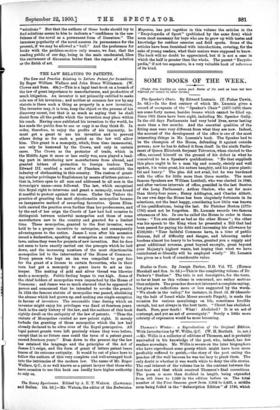THE LAW RELATING TO PATENTS.
The Law and Practice Relating to Letters Patent for Inventions. By Roger William Wallace and John Bruce Williamson. (W. Clowes and Sons. 40s.)—This is a legal text-book on a branch of the law of great importance to manufacturers, and productive of much litigation. An inventor is not primarily entitled to make sole use of his invention ; and neither at common law nor by any statute is there such a thing as property in a new invention. The inventor may, it is true, keep the object or the process of his discovery secret, but that is as much as saying that he shall desist from all the profits which the invention may place within his reach. Having once published his invention to the world, he has made the public free to use or copy it as they think fit. In order, therefore, to enjoy the profits of his ingenuity, he must get a grant to use his invention and to prevent others doing so for such a period as the law will allow him. This grant is a monopoly, which, from time immemorial, can only be bestowed by the Crown, and only in certain oases. The Crown as the protector of trade, which in the Middle Ages it more or less really was, soon played a lead- ing part in introducing new manufactures from abroad, and granted letters of protection to foreign traders. Thus Edward III. enabled a native of Flanders to establish the industry of clothmaking in this country. The custom of grant- ing similar privileges to Englishmen by means of letters patent— that is, letters open to all men and addressed to all men in the Sovereign's name—soon followed. The law, which recognised this Royal right to intervene and grant a monopoly, soon found it needful to protest against its abuse. Under the Tudors the practice of granting the most objectionable monopolies became an inexpensive method of rewarding favourites. Queen Eliza- beth carried the practice even further than her predecessors, and by the end of her reign the Courts of Law had had occasion to distinguish between unlawful monopolies and those of some manufacture new to the country and granted for a limited time. These monopolies, granted to the first inventor, were held to be a proper incentive to enterprise, and consequently advantageous to the nation. James I. soon after his accession issued a declaration, speaking of monopolies as contrary to our laws, unless they were for projects of new invention. But he does not seem to have exactly carried out the precepts which he laid down, and the increasing numbers of the most objectionable monopolies led to the intervention of the House of Commons. Every person who kept an inn was compelled to pay fees for the grant of a license to certain favourites, who in their turn had got a monopoly to grant leave to act as inn- keeper. The making of gold and silver thread was likewise made a monopoly. Public feeling began to run high. Some of the chief holders of monopolies were impeached by the House of Commons ; and James was so much alarmed that he appeared in person and announced that he intended to revoke the grants. In 1624 the famous statute of monopolies was passed, abolishing the abuses which had grown up, and making one single exception in favour of inventors. The reasonable time during which an inventor might enjoy his privileges was fixed at fourteen years. Such is the early history of the law, and the authors of this book rightly dwell on the antiquity of the law of patents. "Thus the statute of Monopolies created no new patent right. It merely forbade the granting of those monopolies which the law had already declared to be ultra vires of the Royal prerogative. All legal patent grants were left precisely where they were before. except that in no future case could the term of a patent grant
exceed fourteen years." Even down to the present day the law has retained the language and the principles of the Act of James L's reign, and the form of grant of letters patent bears traces of its extreme antiquity. It would be out of place here to follow the authors of this very complete and well-arranged book into the intricacies of the modern law. The name of Mr. Roger Wallace, Q C., is so well known as a patent lawyer that those who have occasion to use this book can hardly have higher authority to rely on.






































 Previous page
Previous page